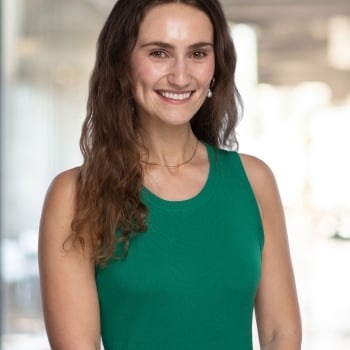By
Published
November 25, 2025
Tags
SUMMARY:
In 2024, students in New York City Public Schools achieved remarkable gains in reading proficiency. One factor that made a difference: the level of support teachers received to improve their practice. Through partnerships with organizations like Teaching Lab, educators work with expert coaches to refine their teaching in real time to better support student learning. In a recent episode of the podcast mini-series, Bright Spots, Teaching Lab founder Dr. Sarah Johnson joined a New York City teacher and coach to reflect on this progress and how coaching helps students thrive.
This story is adapted from Bright Spots, a new mini-series within the Good Things podcast. Produced in partnership with Lemonada Media, the series features bite-sized stories of community impact that leave listeners feeling inspired and hopeful about what is possible. In a moment when so much feels uncertain, each story shines a light on the people who are making a difference in their communities right now, and the solutions that can make a difference in other communities, too. Listen to the episode below or wherever you get your podcasts, and check out Good Things for additional episodes.
When professional athletes are not competing, they are practicing: reviewing past game footage, meeting with coaches to analyze performance and training alongside teammates. But imagine if the stakes were even higher. What if, instead of a game, these players were holding the future of the next generation in their hands?
Our grantee, Teaching Lab, understands that in classrooms across the country, the stakes really are that high. Yet unlike athletes and other professionals, teachers rarely receive ongoing high-quality coaching and practice. Instead, professional development for educators is often limited to occasional workshops or one-size-fits-all programs, if it is offered at all.
Dr. Sarah Johnson, CEO of Teaching Lab, encountered this lack of coherent support in her early years of teaching. On her first day, she received a workbook titled, Buckle Down, and was told, “Go teach.” And so, she did. For years, she navigated the classroom on her own, struggling to keep up while supporting all 150 of her students.
It was not until Sarah met a mentor that her perspective—and practice—began to change. Equipped with her mentor’s regular feedback, lesson-planning guidance and strategies for addressing daily challenges, Sarah experienced the transformative power of coaching. She asked herself: What if every student had a teacher who benefited from this level of support?
Teachers and students alike reap the benefits of this coaching on a daily basis. New York City-based teacher, Luke Lee, and Teaching Lab coach, Cara Farber Rossen, joined Sarah on a recent episode of Bright Spots to share more about what their weekly collaboration looks like.
“If you've ever played a sport and had a coach who made an impact, the underlying theme is that the coach has watched you actually do what you’re trying to get better at,” Luke explained. “Rather than just looking at numbers and data, Teaching Lab coaches watch you in action.”
Rather than just looking at numbers and data, Teaching Lab coaches watch you in action.
Each week, Luke and Cara plan lessons together, break down components of instruction and sometimes go line-by-line to ensure every student gets the guidance they need. As a result, students in Luke’s classroom are not only reading, but are excited to read.
“When I came back after a couple of weeks between coaching visits, students would say things like, ‘Miss Farber, you won't believe the book we started reading,’ and they would tell me all about it,” Cara shared.
These gains are especially meaningful in New York City, where literacy improvements have often been slow, and pandemic-related learning loss has left many students struggling. As Teaching Lab’s results show, one effective route to making up for these losses is investment in teachers, their support networks and their development.
“Every single teacher wants kids learning at the highest levels. We have to ask ourselves, ‘why isn’t this happening?’ and then go fix that problem,” Sarah said. “To me, it’s about giving teachers the support they deserve, so they can give students the support they deserve.”
It’s about giving teachers the support they deserve, so they can give students the support they deserve.
Teaching Lab’s coaching model is a growing bright spot in our education system, and a reminder for anyone who believes in the power of great teaching and the promise it holds for every student. When teachers get the support they need, students thrive; and when students thrive, communities flourish.
Explore Teaching Lab's approach to coaching in the full Bright Spots episode, out now wherever you get your podcasts. To learn more about Teaching Lab, visit www.teachinglab.org/.
Charles and Lynn Schusterman Family Philanthropies welcomes the expression of personal thoughts and reflections in Toward, our digital magazine. Each post reflects the opinion of its author and does not necessarily represent the views of our organization or our partners.




.png?crop=yes&k=c&w=1170&h=658&itok=j6uorNow)



